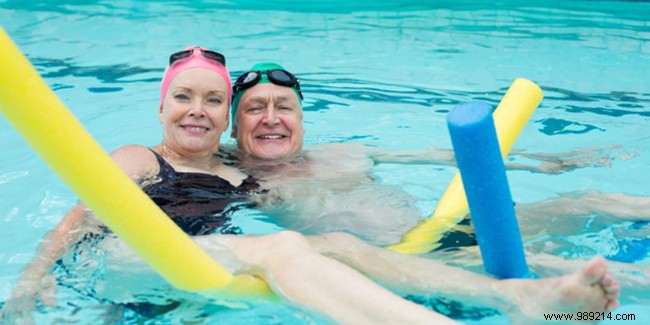
Swimming is a sport reputed to be complete and gentle, accessible, and above all beneficial, to as many people as possible. In this article, we explain why this physical activity is particularly suitable for seniors.
As gentle as the practice of swimming is, there are some contraindications. They are few in number but it is better to be careful and make sure that the practice will be really beneficial for you. Do not hesitate to make an appointment with the doctor who knows you best, general practitioner or specialist. People suffering from heart disease, pneumopathy, epilepsy, skin diseases or certain ENT conditions will be referred to another sport.
On the other hand, a doctor can advise the regular practice of swimming to prevent and relieve diabetes, osteoporosis, osteoarthritis, fibromyalgia or rheumatism. In general, studies have shown that from the age of 55, it is better to favor endurance sports. , and swimming is one of them.
Public health policies work to keep seniors active. A sedentary lifestyle is indeed identified as a threat to “ageing well” because the lack of physical activity leads to health problems. Doctors therefore strongly encourage seniors to practice a sport, and in particular a non-violent sport which limits the risk of injury.
In the sports landscape, swimming is typical of the sport allowing the gentle and lasting improvement of the physical condition of the practitioner. Some swimming pools also offer time slots or lanes reserved for seniors as well as preferential rates for retirees.
Like many other sports activities, swimming stimulates the cardiovascular system, works on endurance and promotes blood circulation. Swimming also maintains good digestion and strengthens the endocrine and immune systems.
Swimming has an antidepressant effect on the body since by practicing physical activity (for a minimum of 20 to 25 minutes), you secrete endorphins, hormones that make us feel better.
One of the advantages of swimming is that it is a non-traumatic sport for the joints , areas of the body that are particularly fragile in seniors. The body, thanks to the lift of the water, does not have to manage impacts:it is therefore not subject to the risk of injury. This is all the more interesting for overweight people.
But water not only carries:it also opposes a resistance that mobilizes the body in a more complete and deeper way. The silhouette is toned.
If you are convinced and want to take up swimming when you do not know how to swim, you will find a solution to start the activity because there are swimming lessons for adults. If you can't find courses suitable for seniors and you fear the gaze of others, and if you have the financial means, you can go for private lessons with a lifeguard. He will offer you a tailor-made approach and will tell you which exercises to do on your own between classes, for more regular practice.
If you are afraid of water, aquaphobia courses exist. It would be a shame to prevent you from practicing this activity so beneficial for a problem that we know how to solve. Moreover, just as some seniors decide to pass their baccalaureate, overcoming their fear of water at an advanced age can be stimulating and very satisfying.
If you are new to swimming, it is advisable to accustom the body with short sessions during which you swim at a slow or moderate pace. Nothing prevents you from staying longer enjoying the joys of being in the water, floating with your head resting on a swim board or your body supported by a foam noodle. The goal of swimming is not to gain speed (unless your temperament is inclined towards this type of challenge) but to favor your well-being. In addition, remember to take the time to warm up before you start swimming (this can be done in the water), mobilizing your joints one by one starting from the neck to finish with the ankles. It is also good to stretch after the session.
If there's one thing you easily forget about swimming, it's to hydrate yourself . It must be done before and after the session, but also during it. The feeling of thirst decreases with age and seniors think little of hydration. Take the reflex to put a bottle of water in your pool gear and remember to drink one or two sips every 15 minutes or so.
As with any sports practice, the benefits for the body are better if the practice is more frequent, even if it is shorter sessions so that it fits into the schedule. Thus, it is better to go swimming 2 to 3 times a week, between 30 and 45 minutes, rather than once for 1 hour or more. If these durations seem important to you, slow down the pace and aim to maintain the effort for at least 20 minutes. Once you start to get comfortable, you can increase by 5 minutes to gradually reach a duration of 45 minutes and more.
Regular swimming can increase your breathing capacity 10 to 20%. Remember that this aspect is essential. Breathing is the source of oxygen for the body, particularly the brain, which alone consumes 20% of the oxygen captured by the body. By increasing the respiratory capacity, we increase our possibilities of daily activity.